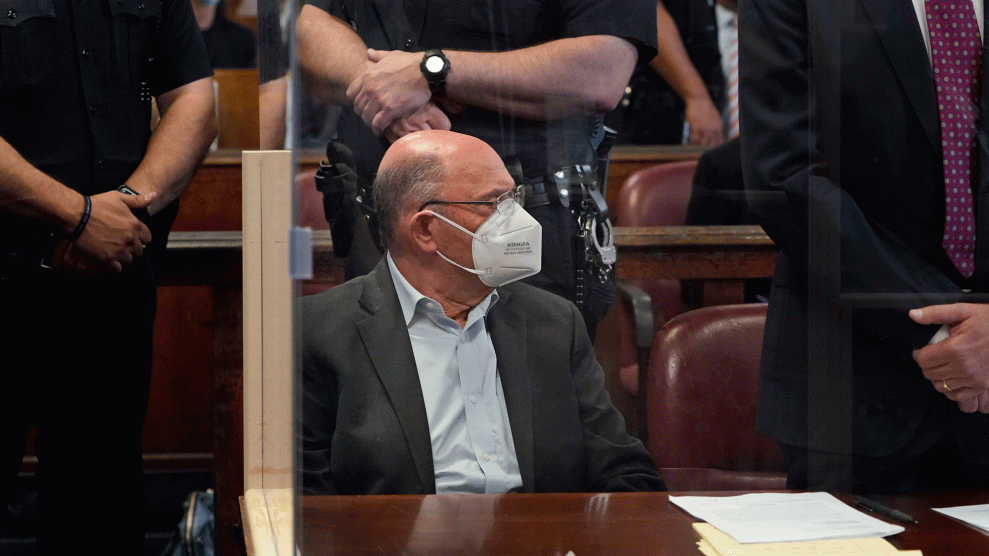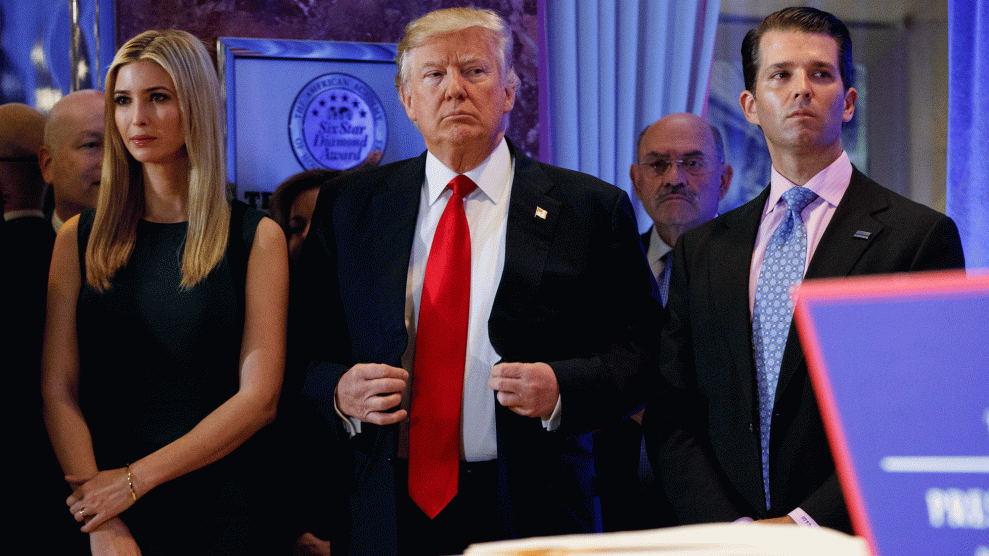
The Trump Organization's chief financial officer Allen Weisselberg appears in court in New York.Seth Wenig/AP
Former president Donald Trump’s company and top corporate lieutenant Allen Weisselberg were indicted Thursday afternoon in Manhattan on charges that they hid from tax authorities $1.7 million in compensation paid to Weisselberg since 2005. Weisselberg, the company’s chief financial officer, and the Trump Organization were charged with grand larceny, tax fraud, falsifying business records, and conspiracy.
Appearing in court, assistant district attorney Carey Dunne made it clear that prosecutors think the alleged criminal activity went right to the top of the company that bears Trump’s name—and that it wasn’t just Weisselberg who benefitted.
“As spelled out in the indictment, this was a 15-year long tax fraud scheme involving off the books payments,” she said. “This is not a ‘standard practice in the business community,’ nor was it the act of a rogue or isolated employee. Instead, it was orchestrated by the most senior executives, who were financially benefitting themselves and the company, by getting secret pay raises at the expense of state and federal taxpayers.”
“To put it bluntly, this was a sweeping and audacious illegal payments scheme,” she added.
Vance’s office may file additional charges in the case and, citing an “ongoing investigation,” has taken steps to limit what information it must share with defense attorneys through the discovery process.
According to the indictment, Weisselberg and the Trump Organization did not report the $1.7 million the company spent on various benefits for Weisselberg as employee compensation. For example, company-covered expenses like the rent on Weisselberg’s luxury apartment in a Trump-owned building were listed as “rent expense” instead of as employee compensation, allowing the company to avoid tax withholdings and its own taxes on the compensation. And Weisselberg, the indictment alleges, never disclosed his company-provided perks—which included his car lease, private school tuition for his grandchildren, carpets for his Florida vacation home, and direct payments of as much as $29,000 in cash—on his own tax returns.
In total, prosecutors allege Weisselberg evaded as much as $900,000 in taxes and improperly claimed another $133,000 in tax refunds.
Weisselberg was at the heart of the scheme Dunne said in court, but she noted, referring to Donald Trump, that “the former CEO signed, himself, many of the illegal compensation checks.” The indictment alleges that, from 2012 to 2017, tuition payments to the private school Weisselberg’s grandchildren attended were paid by personal checks signed by Trump.
Prosecutors did nothing to make the moment easy for Weisselberg, perpwalking him into the courtroom in handcuffs past a crowd of photographers and reporters. Weisselberg has worked for the Trump family for nearly 50 years, starting as an accountant in 1973 for Trump’s father, Fred, and then rising through the ranks of the small Trump Organization to become Donald Trump’s chief financial advisor. New York prosecutors have been pressuring Weisselberg to cooperate for months, investigating both him and his son, Barry, who also worked for the Trump Organization, running the Central Park ice skating rink the company manages.
After Weisselberg’s arraignment, Trump released his own, not entirely coherent, statement shortly after the arraignment: “Do people see the Radical Left prosecutors, and what they are trying to do to 75M+++ Voters and Patriots, for what it is?”
Outside the courthouse, Alan Futerfas, an attorney for the Trump Organization, said the charges were politically motivated and unprecedented.
“These charges are unprecedented, they are unique,” Futerfas said, claiming the issue was just about company expenses and “fringe benefits” and that violations prosecutors alleged are typically pursued through a civil action, not a criminal case. “If the name of the company was something else, I’m fairly certain charges would not have been brought,” he said. Earlier in the week, another Trump attorney complained that he could not find an example of similar charges being brought against a corporation or an employee.
In the indictment and at the hearing, prosecutors stressed that their case was not just about “fringe benefits” but something bigger—a “scheme” to pay employees “off the books” with Weisselberg as one of the largest beneficiaries.
Barbara McQuade, a former US attorney, agreed that the charges against Weisselberg and the Trump Organization are serious and that the argument advanced by the company’s lawyers (that there have been few if any prosecutions for similar conduct) doesn’t carry much weight in court. “When they start saying everyone else is doing it, you’re essentially admitting you did it,” McQuade said.
She noted that tax cases, unlike other crimes, are relatively easy to prove. “Tax offenses are based, almost exclusively, on documents and documents don’t lie,” she said. “If someone has used documents to represent one set of facts on one occasion and claim another on another occasion it can be excellent evidence of intent to defraud.”
Based on the indictment, which made numerous references to internal Trump Organization documents that differed from records filed with tax authorities, prosecutors do seem to have that kind of evidence.
Read the indictment below.
















